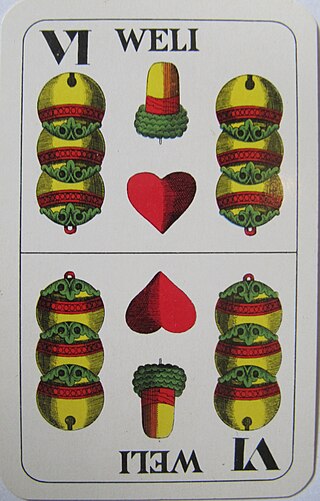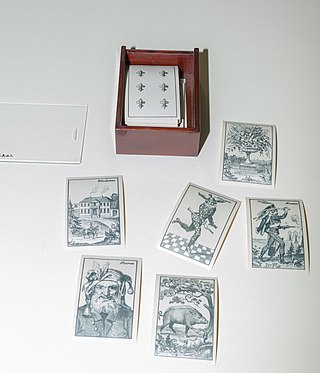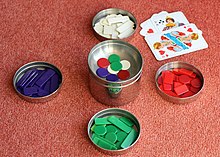
Skitgubbe, and also called Mas, Mjölis, Mjölnarmatte, or Flurst, is a popular Swedish card game that is rated as one of the best for three players. It has two phases: in the first, players accumulate cards; in the second players aim to discard the accumulated hand. The last player to go out is the skitgubbe. Sometimes, the skitgubbe must make a goat noise.

Tippen, also known as Dreiblatt, Dreikart, Drei Karten, Dreekort, Kleinpréférence or Labet, is an historical German 3-card, plain-trick game which was popular as a gambling game for three or more players. The Danish version of the game was known as Trekort and more elaborate Swedish variants include Knack and Köpknack. It appears to be related to the English game of 3-Card Loo. It was banned as a gambling game in some places.

Gaigel is a card game from the Württemberg region of Germany and is traditionally played with Württemberg suited cards. It is a Swabian variant of Sechsundsechzig and may be played with 2, 3, 4 or 6 players. However, a significant difference from Sechsundsechzig and other related games like Bauernschnapsen is the use of a double card deck. The four-player game is usually called Kreuzgaigel. The game emerged in the early 19th century.

Bavarian Tarock or, often, just Tarock, is a card game that was once popular in Bavaria and also played in parts of Austria as well as Berlin. The name is a clue to its origin in the historical German game of [Gross-]Tarock, a game using traditional Tarot cards. At some point in the mid- to late-18th century, attempts were made to emulate Taroc using a standard 36-card German-suited pack, resulting in the formerly popular, south German game of German Tarok. During the last century, the variant played with a pot (Haferl) and often known as Bavarian Tarock or Haferltarock, evolved into "quite a fine game" that, however, has less in common with its Tarock progenitor. German Tarok also generated the very similar game of Tapp, played in Württemberg, and both are related to Bauerntarock, Dobbm and the American games of Frog and Six-Bid Solo. Bavarian Tarock should not be confused with Königrufen, also known as Austrian Tarock or just Tarock.

Dreierschnapsen, Talonschnapsen or Staperlschnapsen is a three-hand variant of the popular Austrian card game, Bauernschnapsen. The rules are very similar to those for Bauernschnapsen except that, instead of two teams of two players, one player bids to become the soloist against the other two who form a temporary alliance. Another difference is that the game makes use of a talon with which the soloist may exchange cards to improve his hand, hence its alternative name of Talonschnapsen. The game is usually played with William Tell cards.

Blattla is a Bavarian card game for four players, who usually form two teams of two for each deal. It is a simplified version of Schafkopf and Bierkopf and is thus a point-trick game. Unlike those two games, in Blattla the Obers and Unters are not permanent trumps. In order to learn the rules of Schafkopf, it can be an advantage to first become familiar with Blattla. The game is traditionally played with Bavarian pattern cards.
Lampeln or Lampln is an old Bavarian and Austrian plain-trick card game that is still played in a few places today. It is one of the Rams group of card games characterised by allowing players to drop out of the current game if they think they will be unable to win any tricks or a minimum number of tricks.

Ramsen or Ramsch is a traditional Bavarian plain-trick, card game for three to five players that is played with a 32-card German-suited pack and is suitable both for adults and for children. It is one of the Rams group of card games that are distinguished by allowing players to drop out if they think they will fail to win the required number of tricks. An unusual feature of Ramsen is the presence of four permanent trump cards that rank just below the Trump Sow (Ace). It should not be confused with the contract of Ramsch in games like Skat or Schafkopf, nor with the related game of Rams which is also called Ramsen in Austria, but is played with a Piquet pack, does not have permanent trumps and has a different card ranking.

Mistigri, historically Pamphile, is an old, French, trick-taking card game for three or four players that has elements reminiscent of poker. It is a member of the Rams family of games and, although it is a gambling game, often played for small stakes, it is also suitable as a party game or as a family game with children from the age of 12 upwards.

Kratzen is an Austrian card game for three to six players that is played for small stakes usually using a 33-card William Tell pack. It is a member of the Rams group of card games characterised by allowing players to drop out of the current game if they think they will be unable to win any tricks or a minimum number of tricks. The game is related to the Swiss Jass form, Chratze and has been described as "fun" to play.
Zwanzig ab, 20 ab or simply Zwanzig is card game for four players. It is a member of the Rams family in which the key feature is that players may choose to drop out of the game if they believe their hand is not strong enough to take a minimum number of tricks. It appears to be a recent, internet-propagated variant of Schnalzen or Bohemian Watten. However, the latter has a natural card ranking, is played with double German cards and a Weli, has no exchanging and has a different scoring system. It is suitable for children from 8 upwards. It may be related from Fünf dazu! which is a simpler game described by Gööck in 1967 that has neither trumps nor the option to drop out.

Norseman's Knock or Norrlandsknack is a classic Swedish card game for 3 to 5 players, known since the mid-1800s. It is traditionally played for money. The game is about winning as many tricks as possible and above all not being completely left without a trick.

Knack is a Swedish card game, mainly played for money, in which the aim is to win at least one of the three tricks. It is also known as Trekort or Trikort, although that usually refers to a more basic game of Danish origin that is probably its progenitor.

Trekort, Tre-Kort or, in Swedish, also Trikort, is an old card game of Danish origin for four or five players that was usually played for money. It was also known in Sweden, where it developed into the variant of Knack. The name Trekort is also loosely used to describe related three-card games such as Swedish Köpknack. The name means "three cards" and may therefore be related to German Dreiblatt.

Svängknack is a Swedish card game for 6 to 8 players that is a further development of Knack and, like the latter, is mainly played for money.

Knektpass or Knekt-Pass, also called Rams, is an old Swedish card game of the Rams group, mentioned as early as 1834. It is a trick-taking game for two or more players and features the four Jacks as top trumps.

Krypkille is a Swedish card game that is played with a Kille pack. The game is similar to the game of Cucumber played with regular French-suited cards.

Femkortskille, also called Knackkille or Bultkille, is a Swedish card game that is played with a Kille pack. The game originated in the middle of the 19th century by transferring the principles of the game of Femkort to a game played with Kille playing cards. Like Kille, Femkortskille is traditionally played for money.
Swedish whist, also called Fyrmanswhist or, regionally, just whist, is a Swedish trick-taking, card game. Knowing four-player whist is useful for playing other card games because it was the prototype for trick-taking games.

Call-ace Whist or Danish Whist is a card game for four players playing in variable partnerships. It is the most popular form of Whist in Denmark, where it is often just called "Whist". It has a well developed bidding system and has imported from the traditional Danish game of Skærvindsel the feature of determining the partnerships by 'calling an ace'. John McLeod records that there is also a version of Danish Whist in which there are fixed partnerships.














